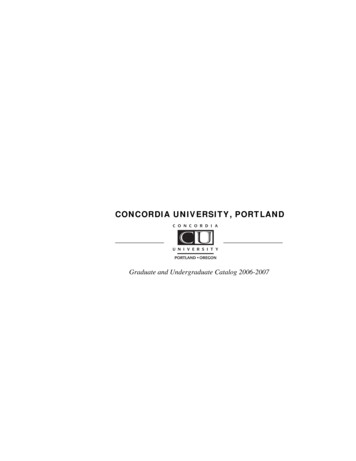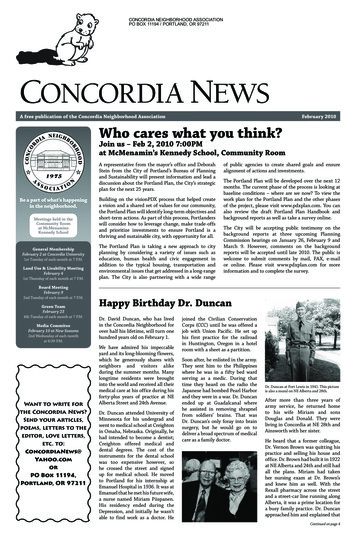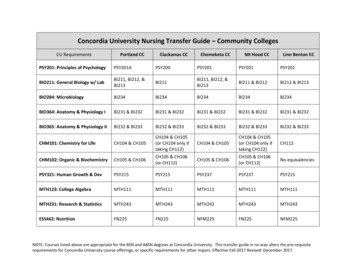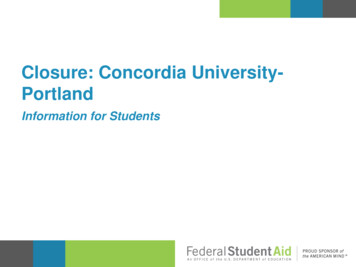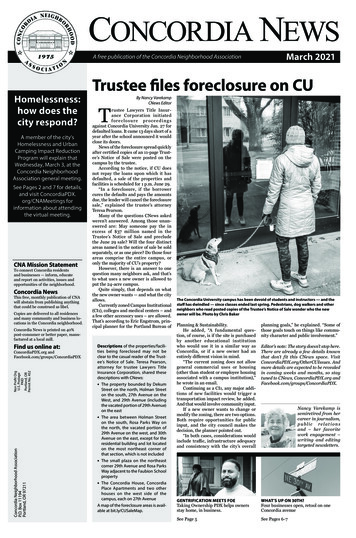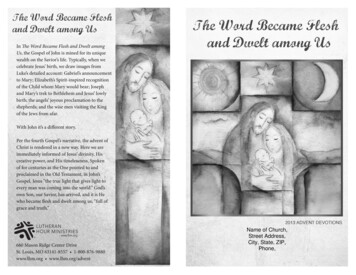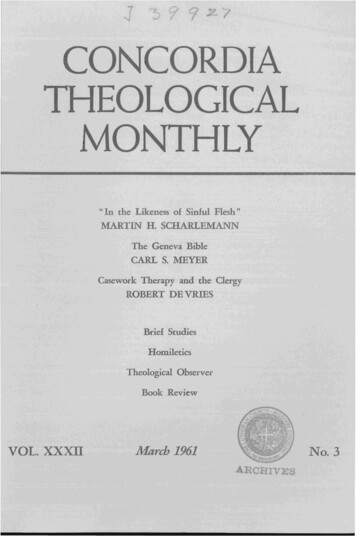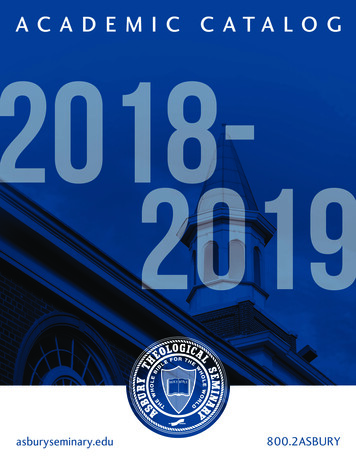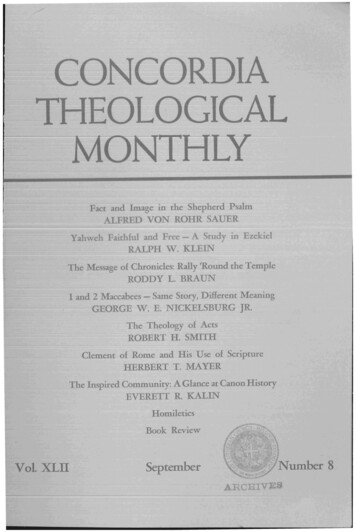
Transcription
CONCORDIATHEOLOGICALMONTHLYFact and Image in the Shepherd PsalmALFRED VON ROHR SAUERYahweh Faithful and Free - A Study in EzekielRALPH W. KLEINThe Message of Chronicles: Rally 'Round the TempleRODDY L. BRAUN1 and 2 Maccabees - Same Story, Different MeaningGEORGE W. E. NICKELSBURG JR.The Theology of ActsROBERT H. SMITHClement of Rome and His Use of ScriptureHERBERT T. MAYERThe Inspired Community: A Glance at Canon HistoryEVERETT R. KALINHomileticsBook ReviewVol. XLllSeptember
"\ aflweh Fdllulul and rice-f.l.in EzekielJLUUYRALPHW.KLEINThe author is assistant professOf' of exegeticaltheology (Old Testament) at Concordia Seminary, St. Louis.THIS STUDY IN EZEKIEL SHOWS HOW AN OLD TESTAMENT PROPHET, KNOWN FORhis somewhat bizarre symbolism, communicated to God's covenant people in the earlyexilic period the good news that Yahweh is indeed faithful to His covel1.ant, yet at thesame time sovereignly free.those deported from Jerusalemj '. mongto Babylon in 597 were Jehoiachinthe king and Ezekiel, a priest. AlthoughJehoiachin had ruled for only 3 months,his importailce and power continued: archaeologists have found jars in Palestineb ' ; J .h12 name e v ( ' is deportadoG.; ,: Babyloni:: :. records refer to him as "king of Judah"; and hisparole from prison in 561 is marked withalmost messianic joy in 2 Kings25:27ff.It should come as no surprise that the 13dates in the book of Ezekiel are based onh'don. By .'. ,. chronologyto Jehoiachin, Ezekiel in fact may be indicating the vanity of pinning any hopeson Jehoiachin's uncle Zedekiah, who ruleduntil the final destruction of Jerusalem.The dates themselves help us understandEzekiel and his situation, No fewer thanseven of them come from the hectic years587 and 586 during the finaJ siege ofJerusalem. They tend to underscore theradical fate Ezekiel holds out for Israel.According to modern calculations, the firstof the dates given is July 31, 593, thedate of his call 1; the last is April 26,Just as Jeremiah had sharply criticized allplans for overthrowing Nebuchadnezzar in 5941493571. His ministry thus overlaps that ofJeremiah, who lived to the late 580s, andantedates by about 20 years the activityof Deutero-Isaiah. His importance lies inthe way he saw no escape from the judgment of deportatlOn anci especially in thevwy He began toup the piecV":e theology and eld them i:lto agreat new hope.In that time of radical change, Ezekielpointed to Yahweh, who was faithful toHis promises, but free to change their specific shape and content, No better exampleof this faithful and free Yahweh could becited than Ezekiel's last dated oracle (29:17-21). After a B-year siege of Tyre,Nebuchadnezzer had not been able to effect the total destruction announced in26:7 ff. However severely Tyre had beenreduced in power, it had not yielded theexpected spoil and riches to its besieger.Still Yahweh will remain faithful to thatearlier promise, Ezekiel announced, but inHis freedom as Lord of history, God hasdecided that Egypt rather than Tyre willbe the nation to surrender totally to theBabylonian king.(see chapters 27-29), so Ezekiel's call a yearlater emphasizes the impossibility of Jerusalemescaping God's judgment.
494YAHWEH FAITHFUL AND FREE-A STUDY IN EZEKIELEZEKIEL'S CALL (s)Ezekiel's call also demonstrates continuity within change. Like other prophets(Micaiah and Isaiah) Ezekiel saw a visionof Yahweh sitting on a throne, but whata throne it was! It was placed on a platform supported by four beasts, each ofwhich had faces of a man, lion, ox, andeagle. 2 Fire and storm accompanied thisthrone-chariot, and it came from the"north," frequently alluded to in the Bibleas God's home (Is. 14:13 and Ps.48 :2).With a delicacy born of priestly training,Ezekiel stops short of claiming he sawGod : "Such was the appearance of thelikeness of the glory of Yahweh." Theemphasis pervading chapter 1 is mobility.The animals have four wings ( whose greatnoise seems to typify Old Testament theophanies) , but the propulsion of the vehicle seems also to be controlled by the"spirit," and the body of each animal terminates in a peglike leg to which is attached a wheel. Tradition is honored byhaving the prophetic call take place beforethe enthroned Yahweh, but the new circumstances of Ezekiel's presence in Babylon, an unclean land far removed fromcult and temple, necessitate this visual andauditory emphasis on God's real presence.It would have been irrelevant to refer toYahweh as the one "sitting on the cherubim" or "making His name dwell in thetemple"; instead, He has become a sanctuary for Israel in a small way in the landwhere He has scattered them. (11 :16)The actual commission is typically prophetic in content: lamentation, mourning,2 Man's primary place among the animals ismatched by the priority of the other three amongthe wild animals, domestic animals, and fowl.Only the best for Yahweh's throne!and woe. To indicate the fullness of thejudgment, the scroll that contains this message has writing on both sides - not theusual procedure. The people to whomEzekiel is sent are called rebels, whileEzekiel's dependence on God's authority isemphasized by his equipment with a hardforehead and by the title "son of man"with which he is addressed. The NewEnglish Bible's rendering of this phrase by"Man" accurately catches the emphasis onEzekiel's native lack of authority. Theprophet shows that he is not a rebel byobediently eating the scroll, thus makingthe message of doom his own. What Jeremiah had said metaphorically ("Yourwords were found, and I ate them, andYour words became to me a joy," 15: 16 )is performed literally by Ezekiel, theprophet known for his often somewhatweird symbolic actions. Bitter as the wordsof judgment are, the fact that God speaksat all seems like sugar in the prophet'smouth.In addition to his role as prophet Ezekiel received a second call- to be a watchman. This office itself was not a new thing.Whenever an ancient city was threatened,a watchman was appointed by the peopleto give warning of the approaching enemy.Failure to warn meant execution. W altherEichrodt has noted the paradoxical factthat in Ezekiel the same God who wassending danger also appointed the watchman, Ezekiel, evidently to give warningof Himself and of the mortal danger Hebrought with Him. Ezekiel, the responsible watchman, was to give a deep and personal warning to individual wicked men orlapsed pious men. By risking his life theprophet played almost a mediatorial roleas he appealed to individuals, telling them
YAHWEH FAITHFUL AND FREE-A STUDY IN EZEKIELhow the people of God was being reconstituted at this moment, and of the responsibility for everyone that arose fromthis fact. Walther Zimmerli has arguedpersuasively that the implications of thischange in prophetic function are outlinedin chapter IS. To those who are cynicaland blame their fate on the sins of theirfathers (lS:4-20) and to those who areresigned to the mediocre achievements oftheir own lives so far (18.21-32), Ezekieloffers warning and admonishment: "Turnand live."A NEW WORDThe book of Ezekiel has no dear outline or line of argumentation. It is ratheran anthology, perhaps put together by aschool of followers. Yet within this collection there is a gellefaI principle of Ofganiz : cha; 1-24 oracles againstJudah and Jerusalem; chapters 25-32,oracles against foreign nations; chapters33-48, hope oracles Editors seem to haveunderscored this outline by the motif ofEzekiel's dumbness. Seven days after hisrall F olr;ers tongue was made to cleaveto the roof of his mouth, and it was notloosened until a messenger came to him inBabylon informing him that Jerusalem hadbeen utterly destroyed (3 :22-27; 24: 26-27;33:21-22). Clearly, this does not meanthat Ezekiel was silent during the first 7years of his ministry - chapters 1 to 24are full of his words! Rather, it is an editor's way of showing how after the fall ofJerusalem Ezekiel's mouth was opened tospeak with boldness a great new word, aword of hope.At every renewal of the covenant Israelhad recalled God's faithfulness in the exodus when He had brought Israel out ofEgypt with a mighty hand and an out-495stretched arm. Now with Jerusalem fallenand their Babylonian captors claiming thattheir god Marduk had defeated Yahweh,Israel's appeal to that first exodus of some700 years before had a hollow ring. Yet,Yahweh remains faithful to that act byfreely deciding to effect a new exodus, thistime from Babylon (20: 32-44). Just asMiriam had concluded her song about thecrossing of the Red Sea with the confession, "Yahweh will rule brever and ever"(Ex.15:1S), so Yahweh Himself announces now, "With a mighty hand and anoutstretched arm, I will be king over you."God's kingship is shown precisely in Hisdeliverance of the weak. While the firstexodus led from Egypt to the wildernessui i::zu 4:I.llG h2 ucach we: 'J'{T 1" 20 g erarion, the new exodus will lead from allthe nations where Israel has been scatteredto the "wilderness of the ,-vples" (a symbolic name corresponding to the wilderness of Sinai) and a severe judgment inwhich Yahweh as Judge and Shepherd willmake a division among the sheep (compare Matt. 25:31-46). Not everyone whoexperiences the exodus receives the promise. Note how Ezekiel shows his freedomover against earlier exodus traditions byhaving the wilderness stage followed notby the conquest but by a procession toGod's holy mountain Jerusalem (20:40).In the early days of the exile, Ezekiel'spromise was radically new and had to beunderscored by an "As I live" oath byYahweh.Related to this exodus motif is the present form of the symbolic action in 4:4-8.There Ezekiel is commanded to lie on his390 years) toleft side for 390 days (bear the punishment of Israel, and then toroll to his right and bear the punishment
496YAHWEH FAITHFUL AND FREE-A STUDY IN EZEKIEL of Judah for 40 days (40 years). Soafter 430 years an end of punishment anda change of fortune is expected, just asIsrael escaped from Egypt after a 430·yearcaptivity (Ex. 12:40). Scholars have proposed to begin the 390·year period withSolomon or with the founding of thetemple, although a certain unevenness inthe Hebrew text and a divergent numberin the Septuagint make caution necessary.Of one thing we can be relatively sure: thenumber 430 would have radiated goodnews. After 430 years, God will againfaithfully perform an exodus.The faithful God was confronted witha people in the exile who recognized theirown hopeless situation. "Our bones aredried up, and our hope if 1 1t" (37; 11)To tell such a people about God's actionsIn C past ",,:ght only have contributedto their de::'pwl\ 'l.llCLcfor.c ll.l orlC uf hisvisions (37: 1-14) Ezekiel testifies to Yahweh's new, almost creative act. Employ ing a metaphor remarkably similar to thecreation narrative of Gen. 2 :7, Ezekiel seesGod put flesh on the disarticulated bonesof (t: ::1a(iu:: 3raeI and breathe into themthe spirit of life. Because the situation isso desperate, this "gosper' is cast into theform of a new creation; yes, the rebirthof the nation is seen under the categoryof resurrection from the dead. By thesetwo theological categories, new creationand resurrection, Ezekiel makes clear thatthe future of the nation Israel is totallydependent on God's grace.This pericope also contains three examples of the form called "proof word" (Ef'weiswort): "You shall know that I am Yahweh" (37:6,13,14). Walther Zimmerli'sstudies have shown the significance of thisformula in understanding the goal of Yah-weh's actions. When it is used in connection with words of judgment, it shows thatthe ultimate purpose of God's wrath is tolead to repentance and recognition of Him(5: 13). When it is used as it is in chapter 37 with words of promise and hope,it shows that the ultimate purpose of God'ssaving actions is not merely release fromexile but that ali men may know and acknowledge Him by that name in whichHe has dis,lAO,:d tr ecre . Hir 1L. ing Yahweh. By saying "I am Yahweh," Godsteps out of His hiddenness and lets Himself be known.QThat name, firSt revealed to Moses atthe time of his cali, connotes God's reputation or renown. In fact, the exile createda sc " s tL ;)glc . rrobL for ".lwel sname and reputation The nations hadscornfully observed: "These are the peopleof Yahweh, and yet they had to go out ofHis land" (36:20). God has to act, notbecause of the merit of 181"'1el, but becauseHis own reputation has been profaned.By gathering Israel from the nations andbringing them into the land - by new andfree actions - God keeps faith with Hisname. But neither the rescue of Israel norGod's self-interest in His own name canfully account for these daring new actions.They are also done so that the nations willknow that He is Yahweh (36:23). Thatconcern for the nations, first sounded inthe call of Abraham and repeated againin the vocation of the Servant and themessage of Jonah, is a constantly recurringtheme in the Old Testament. But howeverconstant it may be, Yahweh and Israel arealways pictured as adapting their actionsto new situations. Abraham and his seedeffect material blessings and pray for thenations; the Servant suffers for them;
YAHWEH FAITHFUL AND FREE-A STUDY IN EZEKIELJonah preaches to them and resents theirconversion. Despite this concern for thenations, Israel still lived before the eschatological divide of the resurrection of Jesusand the missionary journeys of Paul. ThereGod's faithfulness to His promise to thenations is matched by His freedom to actin a way sufficient to incorporate theminto His people.AN ETERNAL COVENANTNo Biblical word embodies continuityand change more than the word covenant.For some it denoted that unilateral agreement with the patriarchs that was fulfilledin God's covenant with David (see Gen.15 and 2 Sam. 7 and 23); for others God'sagreer:l;:.:lt,vith the pJ.z:iarchs ''',:;;:1t '.8.tede covenLt Sina')venant to- -,: -'1 David and the monarchy were subservient (Deut. 17); for still others God'seternal covenant, which He had unilater Hy given or established after the floodwith Noah and with Abraham, the fatherof the nation, could not really be brokenby sin or exile but would always exist dejure and could be realized de facto whenGod's presence with His people was celebrated and His worship properly carriedon (Gen.9 and 17, and Ex.25ff.). Theprophets had been announcing for twocenturies that the curses attendant on theSinai covenant were about to be unleashed.Hosea had laid it on the line: "You arenot My people, and I am not your God."(Hos.1:9)Already Jeremiah had proposed a remedy for this broken covenant (Jer.31:3134). It would be initiated by God's forgiveness and would be welded to an innatedesire to do God's will. The fact that this"faith" would be "active in love" is em-497phasized by the words "I will put My lawwithin them, and I will write it upon theirhearts. . . . No longer shall man teach hisneighbor and teach his brother, saying,'Know Yahweh,' for they all know Me,from the youngest to the oldest."Ezekiel now rings the changes on theseold covenant ideas. Unlike the referenceabove to that eternal covenant made withthe patriarchs or with David, Ezekiel'seterna LUVcnant w c: neut" :u i. .IL\'" fu tille. like Jeremiah's new covenant it emphasizes forgiveness and new obedience.Yahweh remains faithful to forgiveness asthe sine qua non of a new covenant, butHe is free to conform Himself to thepriestly propensities of Ezekiel when HeJay:;: "I will p::nkle Cbl:1 ':!ater UPQl1you, a J.et you shall be dean frolJouruncleannesses, and from all your idols Iwill cleanse you" (36:25). This same fidelity and freedom toward the covenantclimaxes in God's gift of the eucharist inwhich He gives us the body and blood ofHis new "testament" and the forgivenessof sins.Like his older contemporary Jeremiah,Ezekiel was aware of the necessity forcovenant obedience. Jeremiah solved theproblem of recalcitrant Israel by announcing that Yahweh would inscribe the heartwith law; Ezekiel promises a whole newheart and a new spirit. Gone forever willbe the hardened heart of stone, and in itsplace will be a heart of flesh. Both Jeremiah and Ezekiel seem to be saying thatGod expects a change in behavior fromthose who love Him, and they recognizethat such good deeds can only be donewith the aid and help of God.Every reader of Deuteronomy knowsthat those within the covenant experience
498YAHWEH FAITHFUL AND FREE-A STUDY IN EZEKIELcovenant blessings: long life, many children, good crops, and the like. Ezekielannounces that the new eternal covenantwill be a covenant of peace. Wild animals (a metaphor for invading nations?See 34:8) will be banished from the landso that everyone can stay in the wildernessor woods without fear. "There will beshowers of blessings" and abundant produce everywhere. (34:26-27)A NEWDAVIDOf one thing an Israelite could be sure:there would always be a David. Even thatpromise must have been rocked whenJehoiachin was imprisoned in Babylonand when Zedekiah was cruelly blinded.l1y. : Lt w·· thecudHist of his o\V!J. two sons. Pious Israelites hadprevIously ; en 'itterly disappointed bythe like:.; ot Manasseh and Jehoiakim.Ezeldel reasserted the promise to Davidby announcing one king who would rulethe reunited kingdom. After God told himto take two batons and to write "belonging to Judah" on one and "belonging toJoseph" on the other, he symbolicallyjoined them in his hands in order to symbolize and actualize the unity God seeksamong His people. "When I am theirGod and they My people, they will haveone king." (37:15-23)Elsewhere Ezekiel proclaims the continuity of the Davidic line, but he verycarefully sets limits on the pretensions ofthe royal leader and avoids the word"king." Instead, he is called "My servant,"and his title is "prince" (34:20-24;37: 2 5 ), a title steeped in Israelite traditionof the premonarchical period. Thus thecovenant with David is kept and a newDavid is expected, though his functionsand importance in Ezekiel's VIew of thefuture are strictly limited. Even in themost "messianic" of his passages, 17: 2224, the exaltation of the tender twig of theroyal line into a noble cedar, Ezekiel seemsto be hoping primarily that the nationswill recognize that "I Yahweh bring lowthe high tree, and make high the lowtree." Thus the coming king plays a minorrole compared with the promises of Isaiah,M. l, al" ZecLriah. I--ie is the foil tothe former evil kings (34) or the emblemof unity. (37)YAHWEH IS THERE!Ezekiel's real emphasis lay with thepromise of God's presence among HisP( -leo Ir -'lapt; 37 E,' 'el ul he aon the old promises: the peol1ie will dwellin the land foreve,'; David J1y s Int , ,illbe prince forever; l.v'Iy covenant with themwill be forever; and finally, I will set Mysanctuary in their midst forever. Just asGod's tabernacling with His people wasthe sign of God's goodness and the guarantee for the future in the eyes of thepriestly redactors of the Pentateuch, so thispriestly prophet sees God's faithfulnessmost clearly in His free decision to dwellamong His people forever.The shape and form of that presence isoutlined in Ezekiel's great blueprint forthe future in chapters 40-48. Althoughcontemporary scholarship has detectedvarious strata within these chapters, thereis little here that cannot be integrated intoEzekiel's theology itself or at least understood as the logical extension of histhought.In Ezekiel's 25th year he is led aroundin a vision by a man with a measuringreed. Precise measurements are noted as
499YAHWEH FAITHFUL AND FREE-A STUDY IN EZEKIELthe ground plan of the temple complexis marked oiP Even here continuity andchange seem to be the order of the day.On the north, east, and south are set a pairof outer and inner gates whose descriptions are sufficiently clear that modernarchitects can correlate them with excavation results. Twentieth-century archaeologists have unearthed this style of gate intenth-century contexts at Megiddo, Hazor,and Gezer, three cities whose fortificationis ascribed to Solomon in 1 Kings 9: 15.What is more, we are told in the latterpassage that Solomon also fortified Jerusalem. Since we know that building styleschanged in succeeding centuries, it is clearthat Ezekiel's picture of the eschatologicalJerusalem keeps faith with the past by installing Solomonic gates. But with achange! There are no gates in the west.Instead, behind the temple, which facedeast, is installed a new building for whichthere seems to have been no precedent inpreexilic Israel. Walther Zimmerli has integrated this blocking of western access tothe temple into Ezekiel's theology. In anearlier vision (ch. 8) Ezekiel had visitedJerusalem and had seen the abominationsthere that necessitated its destruction. Mengathered in a room of the temple that wasfilled with pictures of all kinds of creepingthings, perhaps observing the worship ofOsiris, as Albright suggests. Womenright in the temple - were bewailing3 Zimmerli has pointed out that all the dimensions are multiples of the number 25 - thevision itself is dated to the 25th year. He hassuggested that priestly theologians hoped that the50th year would be a year of jubilee and release.Thus, by dating his vision to the 25th year andcoordinating all dimensions to that figure, Ezekiel is announcing, "We're halfway to God'snew day."Tammuz, the young god of the herd, whosedeath was observed in yearly rites. Finally,25 men with their backs to the templewere worshiping the sun! The new temple, Zimmerli reminds us, will be able tobe approached only from north, south, andeast, but not from the west. Instead, theorientation of the worshiper is toward thewest and the Holy of Holies located there.Perhaps by making impossible an approachto the temple with one's face towards thesun, Yahweh is showing again His faithfulness and freedom. The new communitywill be protected by the architecture itselffrom one of their fathers' most heinousSlllS.ANEW LANDThis same kind of protective structuringis explicit in 43 :6-9 when the palace andthe syncretism it stood for is separatedfrom the temple precincts. Ezekiel is arealist about preexilic monarchy. Thesame providential care can be seen in theparceling out of the land according to thefollowing scheme (48):Holy Area PrinceDanAsherNaphtaliManasseh"Ephraim"Reuben Zebulun"GadIPrinceThe straight line down the right side ofthe drawing symbolically represents theJordan River. That is, in the new Israelthe trans-Jordanian regions will not be
500YAHWEH FAITHFUL AND FREE-A STUDY IN EZEKIELincluded. While this may represent Ezekiel's appeal to authentic patriarchal promises according to which only the land westof the Jordan was promised to the fathers,it also may reflect the fact that these territories were always more open to ( thesuspicion of) syncretism and apostasy(Num.32:7,9 and Josh.22:18f.). If so,Yahweh is again demonstrating His faithfulness by freely altering the dimensionsof the lanel no symh lical :-" ,:ecti - 19air-"faIling away.Other reforms and prophylactics areapparent. In addition to the city beingseparated from the temple, which is probably to be located in the priests' section ofthe holy area, it is no longer known as theex(' 've;essiof l' kinL (dty cfDavid) and isfaci: populaced by workers from all the tribes or Israel (48: 19) .Throughout these chapters the prince isascribed no special sacerdotal importancebut is merely a leading member of theworshiping community. Of course, theprince must be provided with necessaryincome, but in another dramatic defenseagainst the ktnd of exploitation represented by 1 Sam. 8:11-17, he is providedwith adequate but carefully restricted parcels of land.The entire picture of the land divisionis not a realistic blueprint, but it symbolizes God's saving plan for His people.Consequently no irregularities of geography are taken into account in the tribaldivisions, but each tribe is ascribed anequal portion. No doubt we can see herea reaffirmation of the egalitarian principles of early Israel in which all thingsreally belong to Yahweh and one is notto accumulate riches at the expense of hisneighbor. The order of the tribes in theland also bears little resemblance to thedivisions of the tribal league. Dan is stillin the north, and seven of the twelve tribesare north of the temple, thus approximating the Northern Kingdom's greater size,but the general organizing principle is different. The entire land finds its focus onthe temple and the temple's guarantee ofGod's presence. Next to the sacred areaascribed to priests, Levites, and city arefc . trib on h si": thar we havemarked with an asterisk. What they havein common is that these "sons of Jacob"were born to one of his wives, Leah orRachel. The other four tribes resultedfrom the union of Jacob with Bilhah andZilpah, his wives' maids. Thus degrees of"1: ,. less" 'c I:·' Out -Istsa,area, then that of the "full-born" sOPS, thenthat of the sons of concubines. Ezekiel isfl g I. v;';'h emphasis on the centralityof the temple and God's presence.In chapter 10 Ez :kiel described how theglory of Yahweh had lifted up from thefirst temple and headed off toward Babylon, thus showing God's disgust with thesyncretistic activities described in chapter8, His decision to destroy the temple, andHis presence with His exiled people. Inchaptet 43 Ezekiel sees that glory of Yahweh return, accompanied by all the noiseand clatter of theophany. When Yahwehreenters the temple through the east gate,the gate is permanently sealed (44: 1-2).No human would ever tread that sacredpath, and Yahweh's abiding presence withHis people is guaranteed, almost "lockedin."It was customary in Israel to associatestreams and rivers with Yahweh's sanctuary. The image of the "river whosestreams make glad the city of God" (Ps.
YAHWEH FAITHFUL AND FREE-A STUDY IN EZEKIEL46:4) is familiar to many readers of theBible. When Yahweh will dwell in Hisnew temple in the idealized land, that tradition will be maintained and freely elaborated. Ezekiel follows the trickle of watercoming from the temple through the Judean desert until it becomes a river deeperthan his head (47). Along the banks ofthat stream trees flourish abundantly - inthe desert! -and when it empties into theDead Sea, there is life. L :lerm,- andby the sea and catch fish! The meaningis clear. God's presence with His peoplebrings life, a life that can heal and transform things as dead as the Judean wilderness and as lifeless as the Dead Sea - oreven by implication as lifeless as defeatedPicking up the pieces of the Israelite faith,he forged them into great good news forthe early exilic period. The heuristic valuefor us and our hermeneutics seems limitless. We note how God remained faithful,for example, to His messianic promises toancient Israel, but freely combined themwith the hope of the Suffering Servant andthe Son of Man in the one whom we confess as "His only Son our Lord." Ezekiel's. Jion L ,, lat G ' presc-:e waul . anto His people has been fulfilled with sovereign freedom and benefits beyond Ezekiel's wildest imagination in the incarnation, life, death, and resurrection of theChrist. Truly He makes all things new.The living and life-giving streams issuingbeco#-U. som .".,:. .""t f:A.0ffi Sv J.;} pr J.A,"""," !?k .;) 'Y t. , a favorite in. later writers (Joel 4: 18-21,Zech.J4:8, Rev.22:1ff.) and may evenpartially explain the imagery in John'sGospel of the water that flows from thepierced side of the cruci:fied Jesus.The final verses of the book develop theimagery beyond what may have been Ezekiel's original plan but in a way congruentwith his theology. The city itself is givena name that emphasizes this priest's hopeand confidence for the future. Even herethe city is no mere "City of David" orJerusalem, but the book ends with the triumphant words, "the name of the cityhenceforth shall be 'Yahweh Is There.' "Ezekiel in a time of radical change faithfully executed the hermeneutical task.creative power,; under the Trilliwrian il1vocation at Holy Baptism. Yahweh isfaithful .J free! '".I.':)fael.L ls501thL.u.a.'-oSt. Louis, Mo.4 I am greatly indebted to the commentaryby Walther Zimmerli (Biblischer KommentarXlII [ly6YJ) whICh is scheduied for an English edition in 1972 in the magnificent Hermeneia commentary series to be issued by Fortress Press in Philadelphia. Zimmerli's commentary runs to more than 1,400 pages. He is meticulous, critical, and deeply evangelical. I havealso learned much from Walther Eichrodt's commentary, originally published for the series DasAlte Testament Deutsch (Gottingen: Vandenhoeck and Ruprecht, 1959 and 1966), but nowavailable in English from the Westminster Pressin Philadelphia (1970).
pointed to Yahweh, who was faithful to His promises, but free to change their spe cific shape and content, No better example of this faithful and free Yahweh could be cited than Ezekiel's last dated oracle (29: 17-21). After a B-year siege of Tyre, Nebuchadnezzer had not
